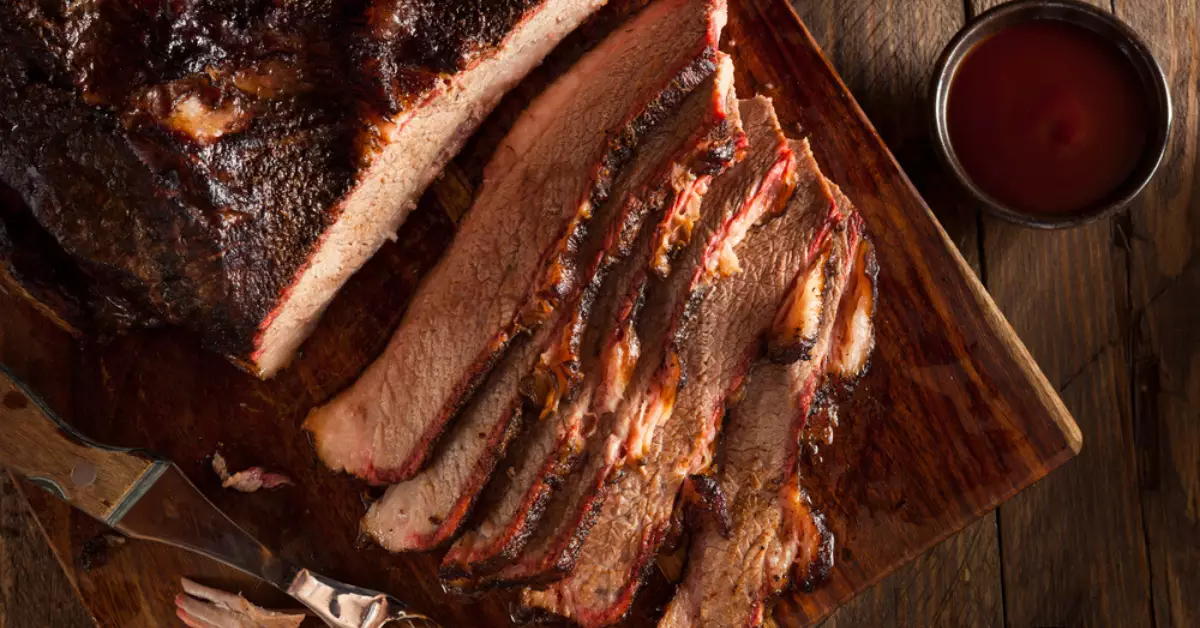Brisket, a prime staple in culinary delights, requires careful preparation to achieve the perfect balance of tenderness and flavor. The process does not end once it leaves the oven or grill; letting it rest plays an integral role too.
The resting period allows the brisket to continue cooking slightly while redistributing and retaining the juices, ensuring a succulent dish. Ideally, a brisket should rest for a period between 1 to 2 hours before it is refrigerated.
When it comes to meat, especially a beautifully cooked brisket, the adage “good things come to those who wait” rings true. The right resting time makes the difference between a good brisket and a great one.
The Art of Perfectly Cooked Brisket
The Importance of Resting Meat
Why Letting Brisket Rest Matters
Resting your brisket is a step that should not be overlooked. This period allows the meat fibers to relax, reabsorb, and redistribute the juices, which are pushed to the surface during cooking. As a result, the brisket becomes tender and flavorful, ensuring a truly satisfying dining experience.
Juiciness and Flavor Retention
Letting the brisket rest aids in maintaining its juiciness and flavor. The heat during cooking causes the muscle fibers to tighten, squeezing out the juices. Resting allows these juices to be reabsorbed, providing an enhanced flavor that will make your brisket the star of the meal.
Decoding the Science of Meat Resting
Heat Distribution and Carryover Cooking
After removing the brisket from the heat source, the process of carryover cooking occurs, where the internal temperature continues to rise, resulting in a more evenly cooked piece of meat. This process also plays a significant role in determining the ideal resting period.
The Role of Juices in Meat Resting
The juices within the brisket, rich in flavor, play a pivotal role during the resting period. As the meat rests, these juices get redistributed evenly. If cut too soon, these flavorful juices would spill out, leaving the meat drier and less tasty.
Time Frame for Resting Brisket
Factors Influencing Rest Time
Size and Thickness of the Brisket
The larger and thicker the brisket, the longer it should rest. A full-size brisket, which is significantly larger than other cuts of meat, generally requires at least 1 to 2 hours to rest.
Cooking Method Used
The cooking method can also impact the resting time. Smoked or grilled briskets, which are exposed to higher cooking temperatures, will need a longer resting time compared to those cooked in a slow cooker.
Optimum Resting Time for Brisket
Minimum Time Required
At the very least, allow your brisket to rest for 1 hour. This is the absolute minimum for smaller cuts, but larger ones will benefit from a longer rest.
Average Time for Optimal Results
For optimal results, let your brisket rest for about 1 to 2 hours. This period allows for sufficient juice redistribution, resulting in a tender and flavorful brisket.
Storing Brisket in the Fridge
Cooling Down Before Refrigeration
Why Rapid Cooling Isn’t Recommended
Placing hot brisket directly into the fridge is not recommended. Doing so may cause a sudden rise in the fridge’s internal temperature, risking the safety of other stored foods. Rapid cooling may also result in condensation, which can lead to a soggy texture on the surface of the brisket.
Ideal Temperature for Refrigeration
Before refrigerating, ensure your brisket has cooled down to at least room temperature. The USDA recommends a maximum temperature of 40°F (4°C) for stored cooked meat. Anything above this temperature for more than two hours can lead to bacterial growth and foodborne illnesses.
Safe Cooling Procedures
To cool your brisket safely, let it rest at room temperature but no longer than two hours to prevent bacterial growth. You may then transfer it to the refrigerator for storage. To expedite the cooling process while maintaining the quality of the brisket, you can slice the meat into smaller, thinner portions, or use an ice bath.
Packaging Brisket for the Fridge
Airtight Containers and Wrapping Techniques
For storage, put your rested and cooled brisket in an airtight container or wrap it tightly in aluminum foil or plastic wrap. This method helps to prevent the brisket from becoming dry and keeps it from absorbing other food odors in the fridge. Remember to keep the fat side up to keep the brisket moist.
The Role of Liquid in Preservation
Adding a small amount of liquid such as broth, gravy, or even the original juices from the cooked brisket can help maintain the brisket’s moisture while in the fridge. This liquid will create a humid environment inside the container, helping to keep the meat juicy and delicious.
Tips to Enhance Brisket Flavor Post-Rest
Reheating Techniques
Oven Reheating for Retaining Moisture
When you’re ready to reheat your brisket, the oven is your best friend. Preheat your oven to a low temperature – around 225°F (107°C). Place the brisket in a baking dish and add a little bit of broth or cooking juices. Cover it with aluminum foil to lock in the moisture and heat until the internal temperature reaches 165°F (74°C).
Microwave Method: Pros and Cons
If you’re short on time, a microwave can come in handy. But be cautious – microwaving has a tendency to dry out meat. If you opt for this method, slice only the amount you plan to eat and heat it in short intervals of 30 seconds, checking in between until it’s heated to your liking. Use a microwave-safe cover to retain moisture as much as possible.
Pairing Brisket with Other Foods
Complementing Sides and Sauces
The succulent flavor of brisket pairs well with a variety of sides. Root vegetables like potatoes or carrots can be roasted and served alongside. A creamy coleslaw or a vibrant garden salad can also add a refreshing contrast to the rich flavors of the brisket. Additionally, a savory sauce like a homemade barbecue or a tangy horseradish cream can further enhance the overall taste of the meal.
Halal Beverage Pairings to Enhance Flavor
A good meal isn’t complete without the perfect beverage. For a refreshing contrast, consider pairing your brisket with a tangy, non-alcoholic beverage. A homemade lemonade or a sparkling apple cider can cleanse the palate and balance the rich, savory flavors of the brisket.
Frequently Asked Questions
Can I Rest Brisket Overnight Before Refrigerating?
No, it’s not recommended to let your brisket rest overnight at room temperature due to food safety reasons. Bacterial growth can occur quickly in certain conditions, and room temperature falls within this “danger zone.”
How Long Can Cooked Brisket Stay in the Fridge?
When stored properly in an airtight container or tightly wrapped, cooked brisket can stay in the fridge for about 3-4 days. If you wish to store it for longer, consider freezing the brisket.
Should I Slice Brisket Before Refrigerating?
If you’re not planning to eat all the brisket at once, it’s best to refrigerate it in larger pieces. This prevents the slices from drying out. When you’re ready to eat, simply slice the amount you plan to serve and reheat.
Conclusion
Achieving the perfect brisket is a testament to patience and understanding the culinary process, particularly the resting phase. This period plays a crucial role in ensuring a tender and flavorful brisket.
Knowing the right amount of time to let your brisket rest and the proper way to store it in the fridge are essential steps in the process. This ensures not only a delicious meal today but also safe and enjoyable leftovers for tomorrow.
Ultimately, a perfectly cooked and rested brisket provides a culinary delight that is worth the wait. So, remember to be patient and let your brisket rest before refrigerating for the best results.







